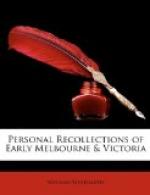He had a remarkable resemblance, in more than one point of character and circumstances, to his brother Scotchman, and fast friend till death, the Reverend Dr. Lang, of Sydney; and had he possessed the physical vigour, not to say the stately proportions, of that most combatant of members of the church militant, he might have been his Victorian rival in a far more prosperous and protracted career. In each there was a very combative mind behind the mildest of manner. Besides the pulpit, Lang sought successfully also the Legislature, where, somehow, clergymen are not favourites. He was, in fact, in the first instance, one of our members for Port Phillip, and it was chiefly to his efforts and abilities that separation from New South Wales was eventually conceded from Home. In the elective contests we saw some of the peculiar talent with which Lang fought his many political foes, when, with an inimitable blandness of address, and the softest of mellifluous language, he would build up a many-sided argument, patiently and leisurely, and at last, as with the bitterly biting end of a stockman’s long whip, flay the Wentworths of opposition, who, with more noise than effect, were ever snapping at his heels.
But, alas for the cause of human perfection! The Doctor, being on a mission Home, and by no means for the first time, for the promotion of the emigration of Scotch Presbyterians to Australia (his great and not unworthy hobby), and being short of funds after raising in one direction all he could upon his bill of lading, horrible dictu! pledged elsewhere for the balance of his account a spare copy of the set, left with him in trust and confidence. Now was the day of vengeance for his foes, and they duly essayed to take it. But the imperturbable Doctor was not troubled with too thin a skin, especially in a matter which was totally devoid of personal pecuniary advantage. The overdraft was, as he expected, readily made up by the public. Nor did he sustain any great moral damage, even with his foes, as his indifference about money was too well known—first his own money, and after that other people’s.
Kerr was in a like plight, but a great deal more helplessly. If he escaped as to character with the many who knew him, yet of necessity he lost his good post. He was succeeded by Mr. Fitzgibbon, who, more fitly, I doubt not, than Kerr, has held this important office ever since, a period of no less than thirty-two years. This serious loss of means and position completed a breakdown that had probably begun before, so that Kerr was no longer able for first-class work. We may envy this opportunity to his old opponent, O’Shanassy, who, in power at the time, generously found him a small appointment—a station upon one of the railways—which gave him, at least, a comfortable, and, in a social way, by no means ungenial home for the short remainder of his life.




